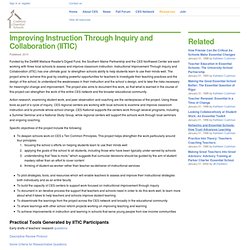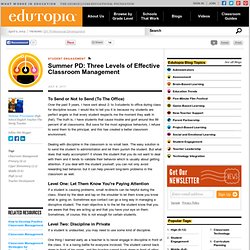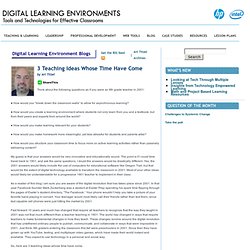

Improving Instruction Through Inquiry and Collaboration (IITIC) Funded by the DeWitt Wallace-Reader's Digest Fund, the Southern Maine Partnership and the CES Northwest Center are each working with three local schools to assess and improve classroom instruction.

Instructional Improvement Through Inquiry and Collaboration (IITIC) has one ultimate goal: to strengthen schools ability to help students learn to use their minds well. The project aims to achieve this goal by creating powerful opportunities for teachers to investigate their teaching practices and the design of the school, to understand the weaknesses in their instruction and the school s design, and to take the risks necessary for meaningful change and improvement.
The project also aims to document this work, so that what is learned in the course of this project can strengthen the work of the entire CES network and the broader educational community. 10 Internet Technologies Educators Should Be Informed About – 2011 Update. These Technologies Are Changing Education.

Are You Familiar With Them? It’s been nearly two and half years since the publication of the first “10 internet technologies that educators should be informed about” article on this site and given the fast paced evolution of technology it’s time for an update. The start of new school year is the perfect time to refresh this list! Below you will find updated information for 5 of the technologies from the original posting, and 5 new technologies that have earned their rightful place in the list (displacing 5 other types of tech, that while still worthy, are not quite as relevant today, IMHO).
100 Awesome Classroom Videos to Learn New Teaching Techniques. With so many good teachers out there, it’s fortunate they can share their knowledge via video on the Internet.

From the funny to the poignant, these glimpses into the lives of teachers and their students will keep you entertained while learning a little something as well. Whether you are a new teacher storing up tips and tricks or an experienced teacher who could just use a fresh perspective, you are sure to find something helpful among these videos. The Basics Reading, storytelling, math, and science all get coverage with these videos that show how some Teaching Storytelling in the Classroom.
Watch children tell stories as a backdrop to educators talking about the storytelling experience. 5 Awesome Things You Can Do With an IPad and an LCD Projector. eSchool News » Five characteristics of an effective 21st-century educator » Print. Readers say key skills include foresight, lifelong learning, and the ability to evaluate new technologies By Meris Stansbury, Online Editor Read more by Meris Stansbury September 9th, 2011 "The effective 21st-century teacher will need to be adept in judging the educative and non-educative use of technologies," said one reader.

Today’s educators are constantly evaluating the skills students need to compete in the global economy. But what are the characteristics or skills needed to be an effective 21st-century educator? We recently asked readers: “What are the qualities of an effective 21st-century educator?” Lectures Are Homework in Schools Following Khan Academy Lead. Published Online: September 27, 2011 Published in Print: September 28, 2011, as Teacher John Willis, right, works with 9th grade physics students during a lab at the Gwinnett School of Mathematics, Science, and Technology while other students debate a problem.
Mr. Willis is one of several educators at the school experimenting with a "flip model" instructional approach. It requires students to watch online lessons and lectures at night so that they can spend class time going in depth with lab work, discussions, projects, and other activities. —David Walter Banks/Luceo for Education Week Premium article access courtesy of Edweek.org. How we will learn. Objectives Builder. E-Textbooks: 4 Keys to Going All-Digital. Learning Tools | Feature E-Textbooks: 4 Keys to Going All-Digital By John K.

Waters08/03/11 When Daytona State College, a 53-year-old former community college in Florida, now a state college offering a four year degree, set out to implement an all-electronic book program two years ago, its goal was to drive down the cost of textbooks by 80 percent. Summer PD: Three Levels of Effective Classroom Management. To Send or Not to Send (To The Office) Over the past 5 years, I have sent about 2- to 3-students to office during class for discipline issues.

WikiEducator. 15 Creative QR Codes [PICS] Free Technology for Teachers. QR Codes in the Classroom. Mobile Learning | Q&A QR Codes in the Classroom Wyoming science teacher London Jenks not only allows mobile technologies in his classroom, but he's also learned how to maximize them as educational tools, tapping the devices for assessments, research, and even student scavenger hunts using QR codes.

By Bridget McCrea08/31/11 At a time when schools are banishing student-owned mobile devices from their classrooms--or, at least making sure the disruptive laptops, tablets, and phones are powered down class begins--London Jenks is taking a decidedly different tack. A science teacher at Hot Springs County High School in Thermopolis, WY, Jenks welcomes iPhone- and Android-toting students into his classes.
A Google-certified educator who teaches earth science, physics, chemistry, and astronomy, Jenks explainedhis reasons for letting down the walls that so many other instructors have erected during this "mobile" age and told us how the strategy has helped him be more effective as a teacher. WHERE GOOD IDEAS COME FROM by Steven Johnson. 3 Teaching Ideas Whose Time Have Come.
Think about the following questions as if you were an 8th grade teacher in 2001:

What Will School Look Like in 10 Years?